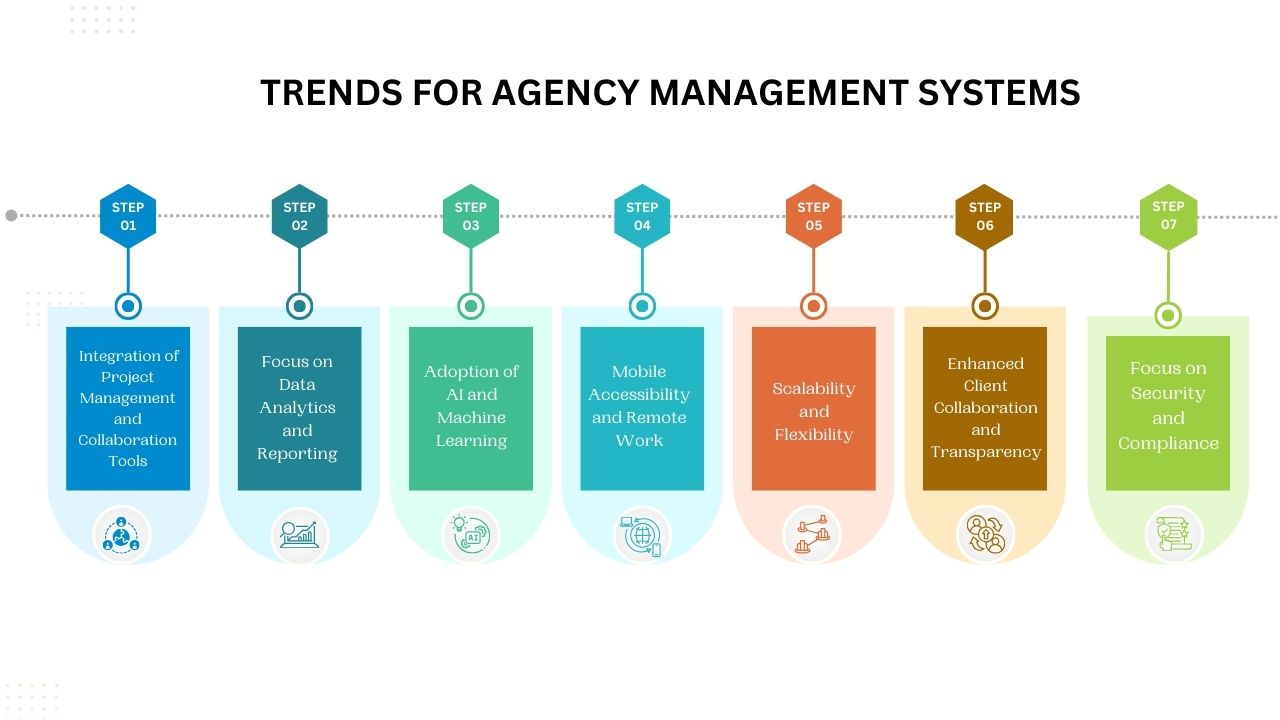
Introduction: Top Agency Management Software Trends
Agency management software plays a crucial role in helping agencies streamline their operations, manage projects efficiently, and deliver exceptional results for their clients. As the demand for digital marketing and creative services continues to grow, the agency management software market is experiencing rapid expansion. In this blog, we explore the key trends shaping the agency management software market, highlighting the innovations and technologies that are driving efficiency and effectiveness in agency operations.
1. Integration of Project Management and Collaboration Tools
Agency management software is increasingly integrating project management and collaboration tools to streamline workflows and improve communication among team members. These integrated tools allow agencies to manage projects from inception to completion, ensuring that deadlines are met and clients are satisfied. By centralizing project management and collaboration, agencies can enhance productivity and deliver projects more efficiently.
2. Focus on Data Analytics and Reporting
Data analytics and reporting capabilities are becoming essential features of agency management software. Agencies are leveraging data to gain insights into their performance, track key metrics, and make informed decisions. Advanced reporting features allow agencies to create customized reports for clients, showcasing the impact of their work and demonstrating ROI. By harnessing the power of data, agencies can optimize their strategies and deliver better results for their clients.
3. Adoption of AI and Machine Learning
Artificial intelligence (AI) and machine learning are transforming the agency management software market, enabling agencies to automate repetitive tasks and improve decision-making processes. AI-powered features, such as predictive analytics and chatbots, are helping agencies streamline their operations and enhance the client experience. By adopting AI and machine learning, agencies can work more efficiently and stay ahead of the competition.
4. Mobile Accessibility and Remote Work
The shift towards remote work has highlighted the importance of mobile accessibility in agency management software. Agencies are increasingly relying on mobile apps to manage projects, collaborate with team members, and communicate with clients. Mobile accessibility allows agencies to stay connected and productive, even when working remotely. As remote work becomes more prevalent, mobile accessibility will continue to be a key trend in agency management software.
5. Scalability and Flexibility
Scalability and flexibility are key considerations for agencies when choosing management software. As agencies grow and evolve, they need software that can scale with their business and adapt to changing needs. Cloud-based solutions are gaining popularity due to their scalability and flexibility, allowing agencies to access their software from anywhere and easily expand their capabilities as needed.
6. Enhanced Client Collaboration and Transparency
When it comes to establishing solid connections with clients and delivering successful projects, teamwork and honesty with them are absolutely necessary. Integration of client portals and real-time project tracking are two examples of the features that are being incorporated into agency management software to improve client collaboration. The clients are able to remain informed and engaged throughout the entirety of the project thanks to these characteristics, which ultimately results in increased satisfaction and trust.
7. Focus on Security and Compliance
In light of the growing danger posed by cyberattacks and data breaches, the most important concerns for government agencies are compliance and security of their systems. Protection of sensitive information is being provided via the incorporation of comprehensive security mechanisms into agency management software. These methods include encryption and secure authentication. Regulatory compliance elements, such as those pertaining to the General Data Protection Regulation (GDPR) and the Health Insurance Portability and Accountability Act (HIPAA), are increasingly becoming standard in agency management software.
Conclusion
The agency management software market is evolving to meet the growing demands of agencies in an increasingly digital and competitive landscape. By embracing trends such as integration of project management tools, data analytics, AI and machine learning, mobile accessibility, scalability, client collaboration, and security and compliance, agencies can streamline their operations, improve efficiency, and deliver exceptional results for their clients. As the market continues to evolve, agencies must stay abreast of these trends to remain competitive and drive success in the industry.